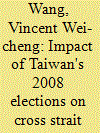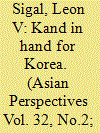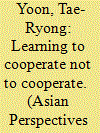| Srl | Item |
| 1 |
ID:
083787


|
|
|
|
|
| Publication |
2008.
|
| Summary/Abstract |
This article argues that there is potential to establish a considerably more comprehensive relationship than has previously existed between the United States and South Korea. Compared to the trans-Atlantic relationship or even the U.S.-Japan alliance, cooperation between the United States and its allies in South Korea is under-institutionalized, does not benefit from the same broad array of cultural programs and policy interaction, and remains quite narrow in its vision and practical application to modern-day global challenges. The broadening of institutional cooperation on the basis of common values and interests is a critical task if meaningful standards are to be established for the future development of multilateral security institutions in Northeast Asia. There is an opportunity to transform the U.S.-ROK alliance relationship so as to fully realize its contributions to regional and global stability and prosperity while simultaneously bolstering the respective national interests of both countries in Asia and around the world. A policy agenda designed to achieve these objectives would promote the expansion of U.S.-ROK bilateral cooperation in global, regional, and nontraditional security and economic areas as well as address changes in the traditional core areas of the bilateral relationship.
|
|
|
|
|
|
|
|
|
|
|
|
|
|
|
|
| 2 |
ID:
083788


|
|
|
|
|
| Publication |
2008.
|
| Summary/Abstract |
As an "index case" of Third-Wave democracies facing existential threat, Taiwan's elections entail important implications for study in comparative politics and international relations. In 2008, three important elections help define the course of Taiwan's democratic development and its relationship with China: the January legislative election, the March presidential election, and a controversial referendum on Taiwan's United Nations entry. This article employs game theory to analyze the impact of Taiwan's 2008 elections on cross-strait relations. It develops an "election game" by examining each principal player's preferences regarding each election. It analyzes Beijing's possible reaction to the potential outcomes, and then examines the actual election outcomes against the model and offers observations on the prospect of cross-strait relations. Overall, the model predicts that cross-strait relations after the 2008 elections will present a historic opportunity, which can be seized or squandered, depending on political leadership
|
|
|
|
|
|
|
|
|
|
|
|
|
|
|
|
| 3 |
ID:
083783


|
|
|
|
|
| Publication |
2008.
|
| Summary/Abstract |
Pyongyang has a longstanding strategy of engaging with Seoul only when Washington is moving to reconcile. It has acted that way for two decades. Time and again, pressure has proved counterproductive; it has only led North Korea to dig in its heels. To Pyongyang, pressure was evidence of Washington's "hostile policy," and that "hostile policy" was its stated rationale for lack of progress in North-South reconciliation. That past is prologue as Six-Party Talks move to a new phase. The DPRK will not take irreversible steps to eliminate its nuclear facilities, let alone give up its fissile material, without abundant evidence of an end to enmity, which will take time. Whether it will do so even then is not certain, which is why significant bargaining leverage needs to be retained for that critical point in the denuclearization process. That does not mean holding up deeper economic engagement or steps toward peace on the Korean peninsula. Nor does it mean doing nothing to address regional security. The key to eliminating North Korea's nuclear arsenal is to move ahead on three other fronts at the same time: a Korean peace process, a regional security dialogue, and economic engagement.
|
|
|
|
|
|
|
|
|
|
|
|
|
|
|
|
| 4 |
ID:
083786


|
|
|
|
|
| Publication |
2008.
|
| Summary/Abstract |
With the conceptual tool of "Pareto optimum" (or "Pareto frontier"), this article offers an explanation as to why the 1965 Korea-Japan normalization was achieved at that particular time. No existing single factor can sufficiently explain the outcome. The exclusive focus of the existing literature on favorable domestic and international conditions only after General Park Chung-hee's military coup in 1961 blinds us to the long-term learning process of the two states. We also need to ask a non-question: Why was normalization so delayed even under favorable conditions at the time? Based on counterfactual analysis, this article argues that without the coup, normalization would have been achieved much faster and in a way more conducive to the genuine Korea-Japan reconciliation. The complicated political situation caused by Park's military coup delayed rather than accelerated the normalization. Refocused analysis suggests that an America-centric approach turns our attention away from the simple but crucial fact that Korea and Japan themselves were most responsible for determining their own bilateral relations, and that the U.S. role in Korea-Japan relations was significant but not determining.
|
|
|
|
|
|
|
|
|
|
|
|
|
|
|
|
| 5 |
ID:
083785


|
|
|
|
|
| Publication |
2008.
|
| Summary/Abstract |
The Khmer Rouge Tribunal is expected by many in the international community to bring a sense of reconciliation to a nation still grappling with the aftermath of more than thirty years of civil war. Yet the gap between national and local reconciliation initiatives tests post-conflict reconstruction efforts to meet the needs of Cambodian citizens who feel unconnected to the tribunal. This article inquires into the interrelationship between national reconciliation processes and grassroots peacebuilding in the form of conflict resolution trainings. Noting that retributive justice processes cannot take the place of restorative justice, genuine reconciliation in Cambodia will need to incorporate culturally-based ritual derived from Buddhism in order to be relevant to local people. The Khmer Institute of Democracy (KID), a Cambodian NGO, serves as a case study for the successes and obstacles to local peacebuilding initiatives.
|
|
|
|
|
|
|
|
|
|
|
|
|
|
|
|
| 6 |
ID:
083784


|
|
|
|
|
| Publication |
2008.
|
| Summary/Abstract |
Recently, multilateralism has become a major buzz word in Asian international relations. Nations in the region are hopeful that multilateral negotiations will serve as a basis for managing the region's problems. The argument here is that hopes that the United States will commit to such arrangements are misplaced. Given both America's history and current U.S. national interests, the United States is likely to make only a partial commitment to multilateralism.
|
|
|
|
|
|
|
|
|
|
|
|
|
|
|
|